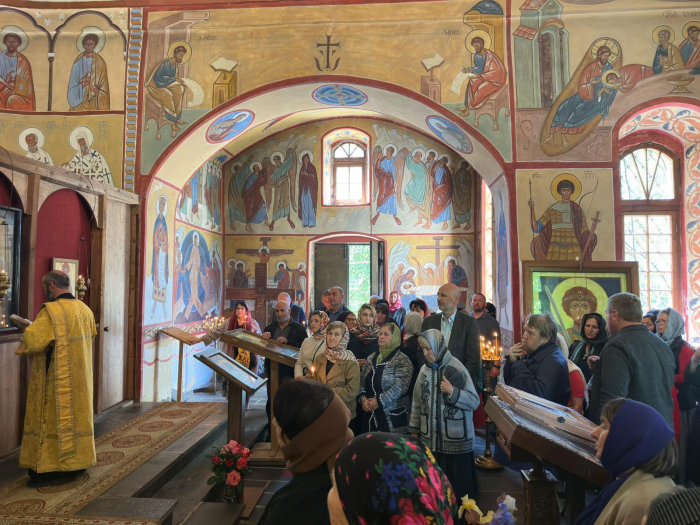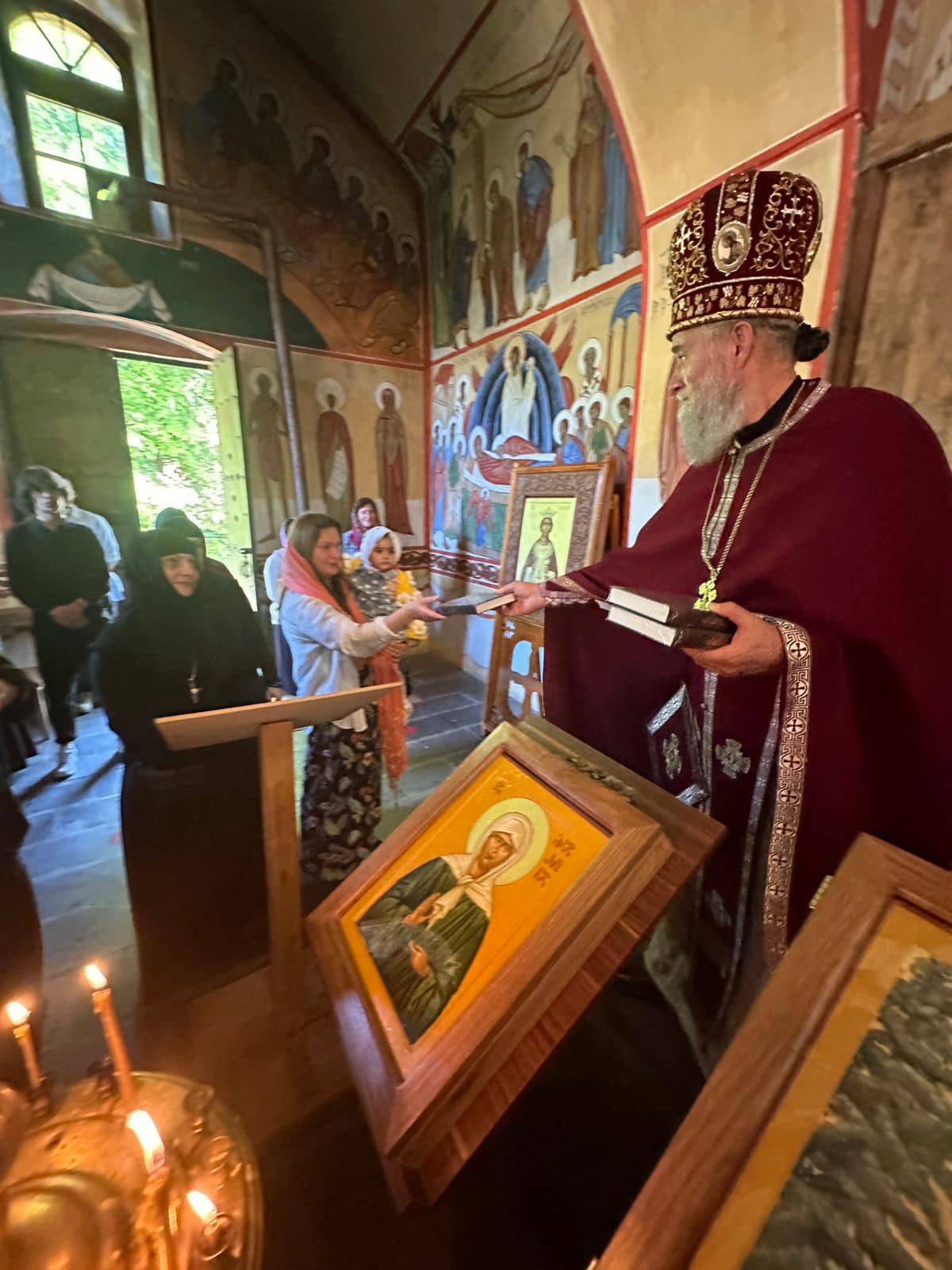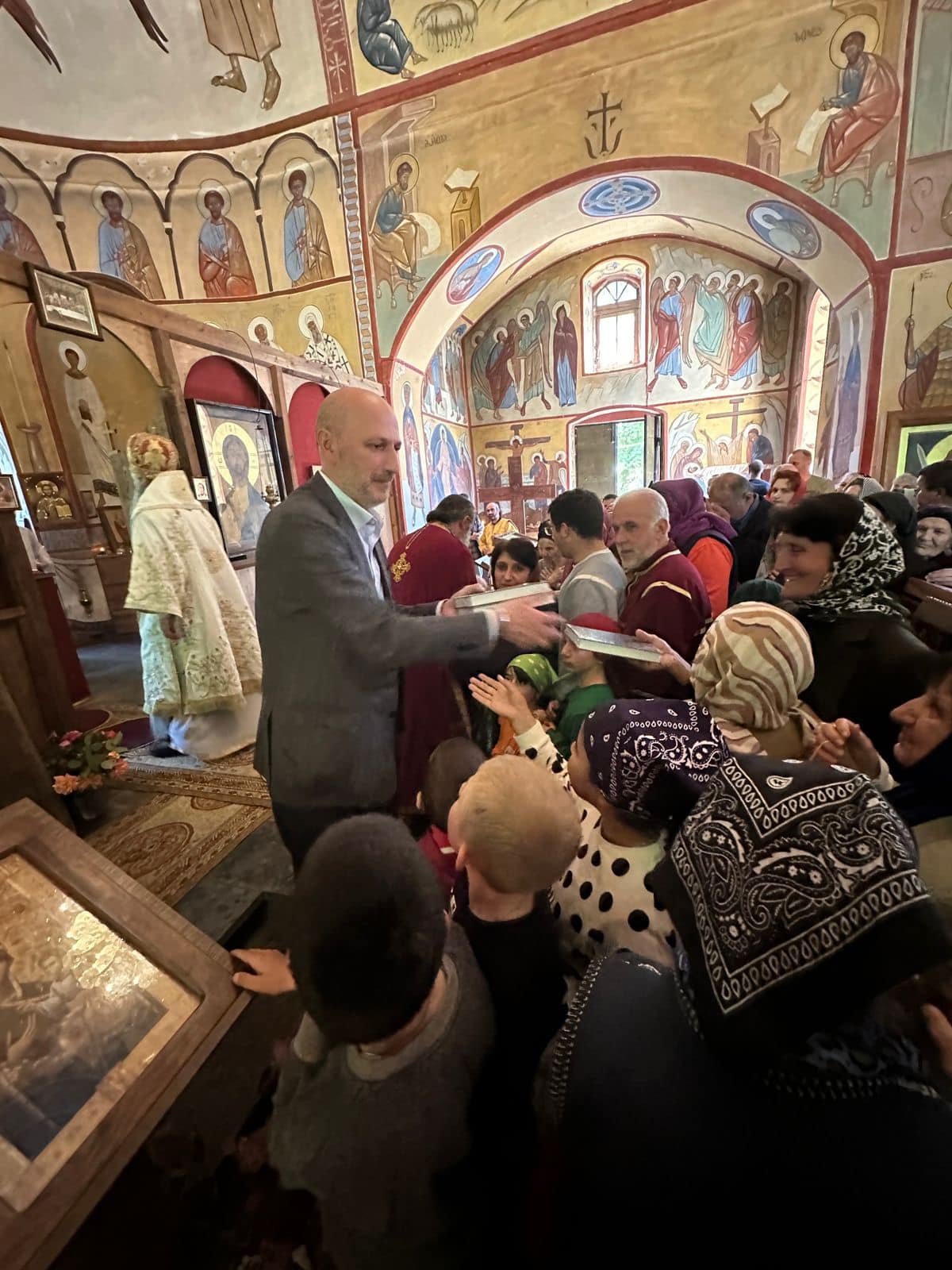08.05.23 18:40

As you know, there are Georgian Orthodox churches not only on the territory of Georgia, but also on the territory of Azerbaijan. And there are many more than in Azerbaijan on the territory of the Republic of Armenia. However, the situation around these churches is radically different.
In Azerbaijan, in the Gakh region, along with Azerbaijanis, Tsakhurians and Muslim Georgians, there are also Orthodox Georgians (Ingiloians). In the neighbouring Zakatala and Belakan districts there are also Georgians-Ingiloyans (together with Azerbaijanis and Avars). But here they are predominantly Muslim and therefore local surviving Georgian churches are not yet used for liturgical purposes. However, the Azerbaijani government also takes great interest in preserving Georgian cultural and architectural monuments.
After nine years of Soviet atheism and mass closures of churches and mosques in the Gakh region of independent Azerbaijan, Georgian Orthodox traditions are gradually being revived. Currently there is a lack of permanently residing orthodox priests and monks, citizens of Azerbaijan, but there is no doubt that with time this issue will be resolved.
This year, a Georgian delegation travelled to Gakh, where they participated in Orthodox services for St. George's Day together with local Orthodox Georgians, citizens of Azerbaijan.
The Georgian State Agency for Religious Affairs, with the support of the Azerbaijani authorities, has already made it a tradition to hold St. George's Day celebrations in Gakh and the Gakh region. On the occasion of St. George's Day (Geogoba) on May 6, 2023, a delegation consisting of representatives of the Patriarchate of Georgia, the Parliament, the State Agency for Religious Affairs, the region of Kakheti and the municipality of Lagodekhi went to the Gakh region of Azerbaijan. The delegation consisted of: Metropolitan of Akhaltsikhe and Tao-Klarjet, the interim administrator of the Diocese of Khornabuja, Ereta and Nekressa Theodor (Chuadze), Priest Peter Kumarashvili, representatives of the Patriarchate, including chanters, State Agency for Religious Affairs Chairman Zaza Vashakmadze and staff of the Agency, Member of Parliament of Georgia Guram Macharashvili, Deputy State Trustee in Kakheti Givi Metreveli, Head of Lagodekhi Municipality Carlo Jamburia, Mayor of Dedoplistskaro Nikoloz Janiashvili and other members of local municipalities.
Members of the delegation visited St. George's Cathedral in the Gakh district, where Metropolitan Theodore and Father Peter Khumarashvili, Rector of Gakhi (Kakhi) Church, served a festive liturgy. After the liturgy, the Orthodox parish received 50 Bibles, which were delivered by the State Agency for Religious Affairs.
Members of the delegation then visited St. George's Cathedral in Kurmukhi, where a paraclete (prayer) was led by Metropolitan of Akhaltsikhe and Tao-Klargeti, the temporary administrator of the Diocese of Khornabuja, Ereta and Nekress, Archbishop Teodore (Chuadze).


Thus, Orthodox Georgians in Azerbaijan are not left without the spiritual care of the Georgian Orthodox Church (GOC). The Azerbaijani government, which, incidentally, restored the St. George's Cathedral in the Gakh district at the expense of public funds, assists the GOC in this.
Exactly the opposite is true of the Georgian Orthodox churches in Armenia. Unfortunately, in the Republic of Armenia, whose authorities are so fond of ranting about "Christian solidarity", it is completely impossible for a Georgian delegation to visit Georgian churches and perform services there. Although, in Armenia there are dozens of Georgian Orthodox churches and unique Georgian monasteries such as Akhtala, Kobairi, Khujabi, Khnevanki, Kirantsi, Svregi and others. Historians claim over 50 Georgian churches and monasteries. All of these churches have either been illegally seized by the Armenian Apostolic Church (AAC) and declared "Armenian" or are in ruins and cannot be accessed by Georgian priests or Georgian restorers. And the same AAC also illegally claims 442 Georgian churches on the territory of Georgia itself.
The fate of the Khujabi monastery on the Georgian-Armenian border, which was illegally seized by the Armenian side, is particularly deplorable. Armenia simply 'moved' the border so that the Georgian church ended up on its territory and is now gradually being destroyed. And when Georgian journalists once tried to approach the church, Armenian border guards met them with shots.
But even if Georgian priests and believers come to the Republic of Armenia, alas, they will not meet their co-religionists, Orthodox Georgians here, where they find Georgian churches or their ruins today. The entire non-Armenian population has been "cleansed" from the territory of the Republic of Armenia. And the Georgians were no exception.
There are no Georgians living where there are Georgian churches in the Republic of Armenia today. In contrast to the areas where Georgian churches are located in Azerbaijan and Turkey, where even today either Muslim Georgians or Orthodox Georgians live, as in the Gakh district of Azerbaijan.
We should remind you that to a large extent due to Armenian nationalists there are no Orthodox Christians even on the internationally recognized territory of Georgia where they used to be majority. The matter concerns occupied Georgian Abkhazia where in 1992-1993 ethnic cleansings were carried out by Baghramyan battalion and other separatist formations with great cruelty and brutality.
Hence the question arises - what kind of "Christian solidarity" is this on the part of Armenian nationalists towards Georgians? After all, in places where they are establishing their authority, Georgians cannot perform services, or simply live and visit their own, Georgian temples.
Varden Tsulukidze
Read: 739
Write comment
(In their comments, readers should avoid expressing religious, racial and national discrimination, not use offensive and derogatory expressions, as well as appeals that are contrary to the law)
News feed
-
What are the dangers of France's interference in Ukraine and the South Caucasus?
13:3719.04.24
-
The Prime Minister met the Ambassador of Iran in Georgia
12:5719.04.24
-
12:1519.04.24
-
Georgian FM meets U.S. Senior Advisor for Caucasus Negotiations
11:2919.04.24
-
Foreign Ministry denies reports about summoning of Georgian Ambassador to Bundestag
10:0019.04.24
-
Parliament to hear Ministers of Interior and Economy on April 19
18:0018.04.24
-
Competition Agency: 23,983 concentrations of economic entities registered in Q1
17:2518.04.24
-
Georgian PM, EUMM Head review situation in Russian-occupied territories
16:4518.04.24
-
UK Ambassador on transparency bill: hindrances to civil society’s functioning “concerning”
16:1018.04.24
-
15:4018.04.24
-
15:3018.04.24
-
14:4218.04.24
-
13:4118.04.24
-
12:4518.04.24
-
11:0018.04.24
-
10:1118.04.24
-
PM: NGOs never decried calls for second front
18:1117.04.24
-
Ruling party official: future of Georgia belongs to Europe
17:0917.04.24
-
16:1317.04.24
-
15:3117.04.24
-
Parliament adopts bill on Transparency of Foreign Influence with first reading
14:5717.04.24
-
GD MP says foreigners should not call for Rose Revolution in Georgia
13:4717.04.24
-
12:4117.04.24
-
Four police officers got injuries during anti-Transparency Bill protest
11:5417.04.24
-
Russia rushes Iran with Resht-Astara railway line
23:4516.04.24
-
18:0016.04.24
-
17:2516.04.24
-
Communications Commission: EU experts say Georgian mobile market “non-competitive”
16:4316.04.24
-
Georgian Foreign Minister, Chinese delegation discuss bilateral relations
16:0016.04.24
-
Mikheil Saakashvili: Ivanishvili declared war against the Georgian people
15:1516.04.24
-
Gabrielius Landsbergis: Georgia's destination is Europe. Do not derail that dream
14:3516.04.24
-
Georgia among top 50 countries in Positive Peace Index
13:5916.04.24
-
Georgian, South Korean officials discuss free trade deal in Seoul meeting
13:0216.04.24
-
Police say 14 detained, officer injured during transparency bill protests
12:1516.04.24
-
11:3716.04.24
-
Legal Issues Committee supports candidates for CEC chairmanship and membership
10:5716.04.24


